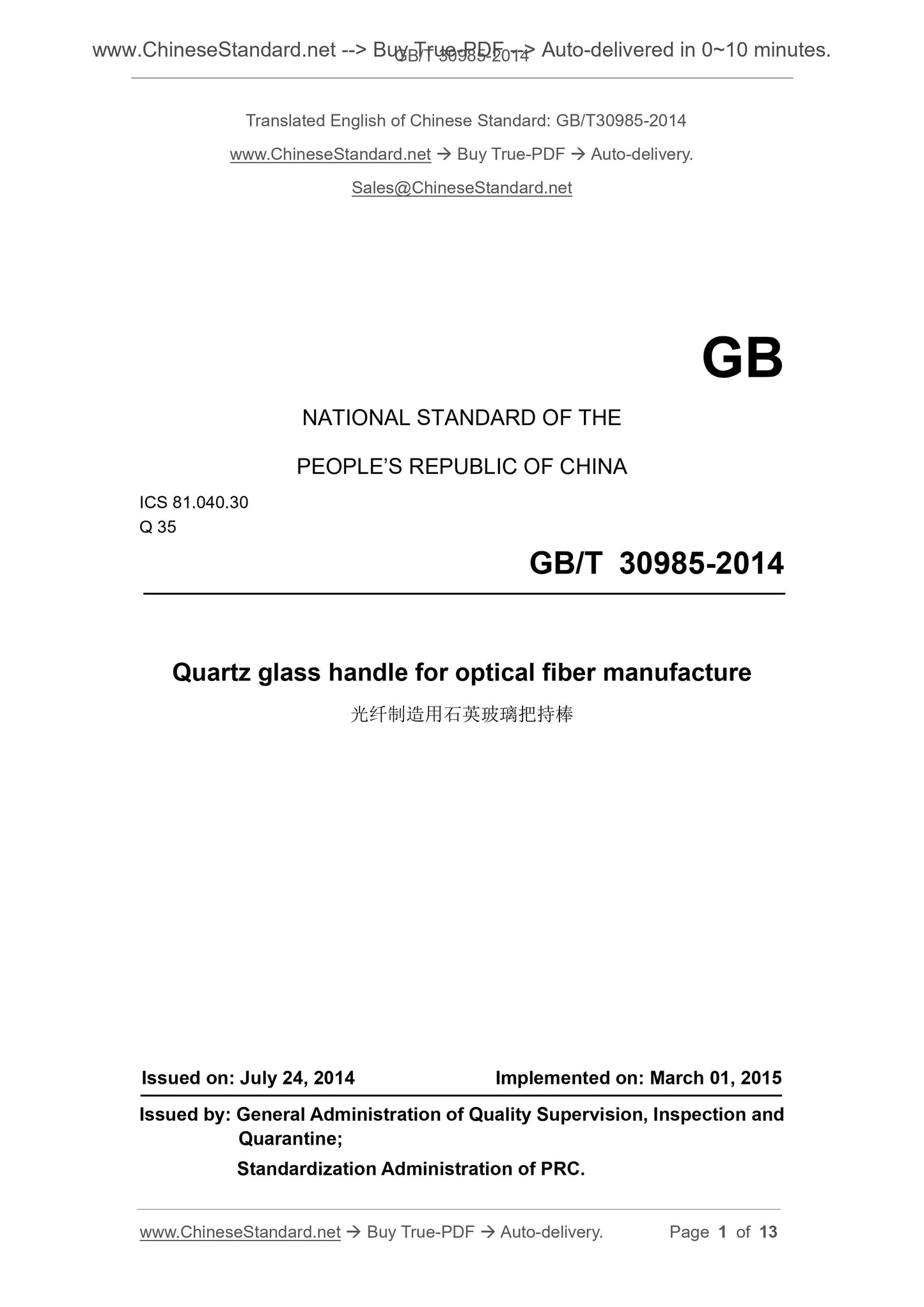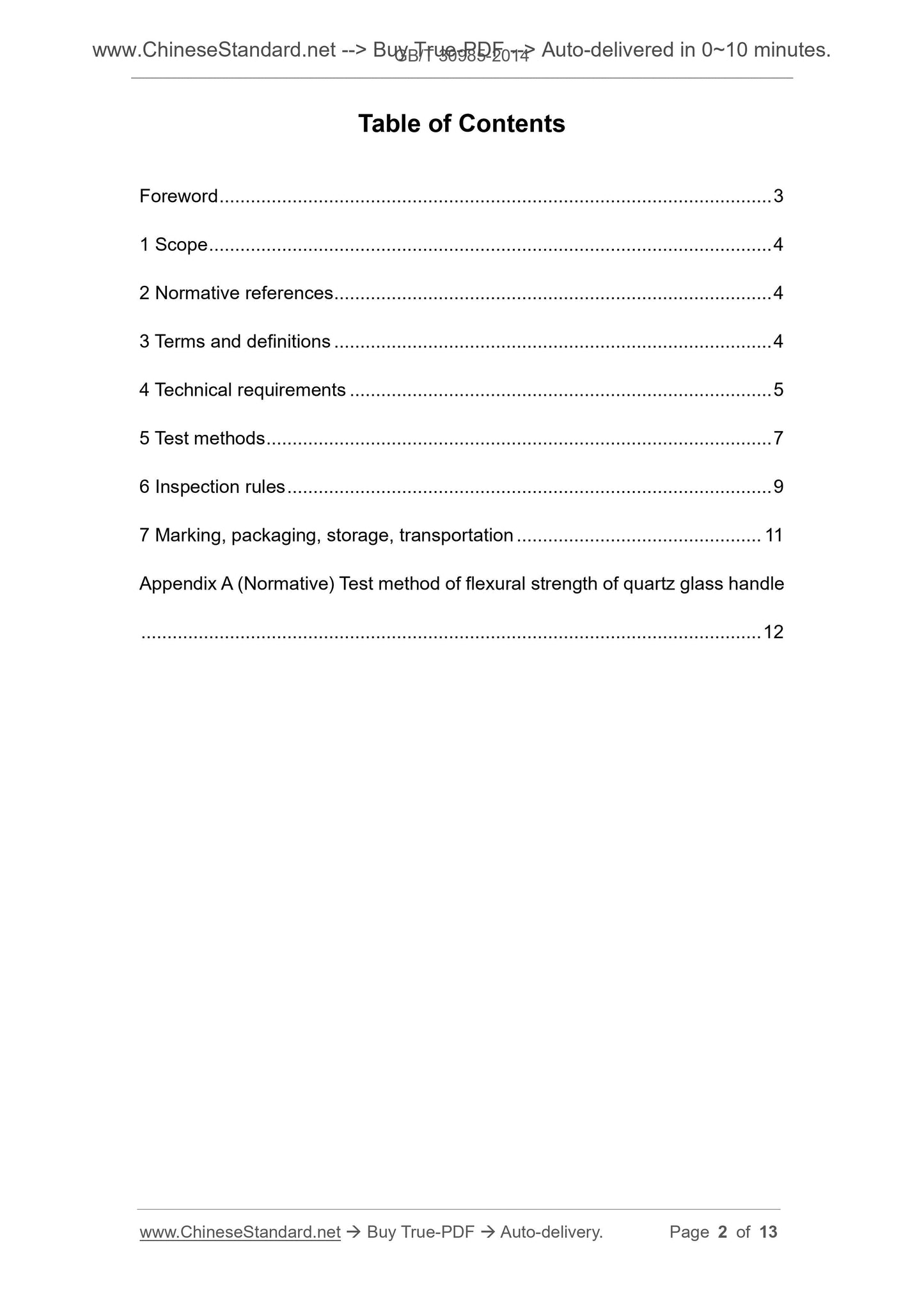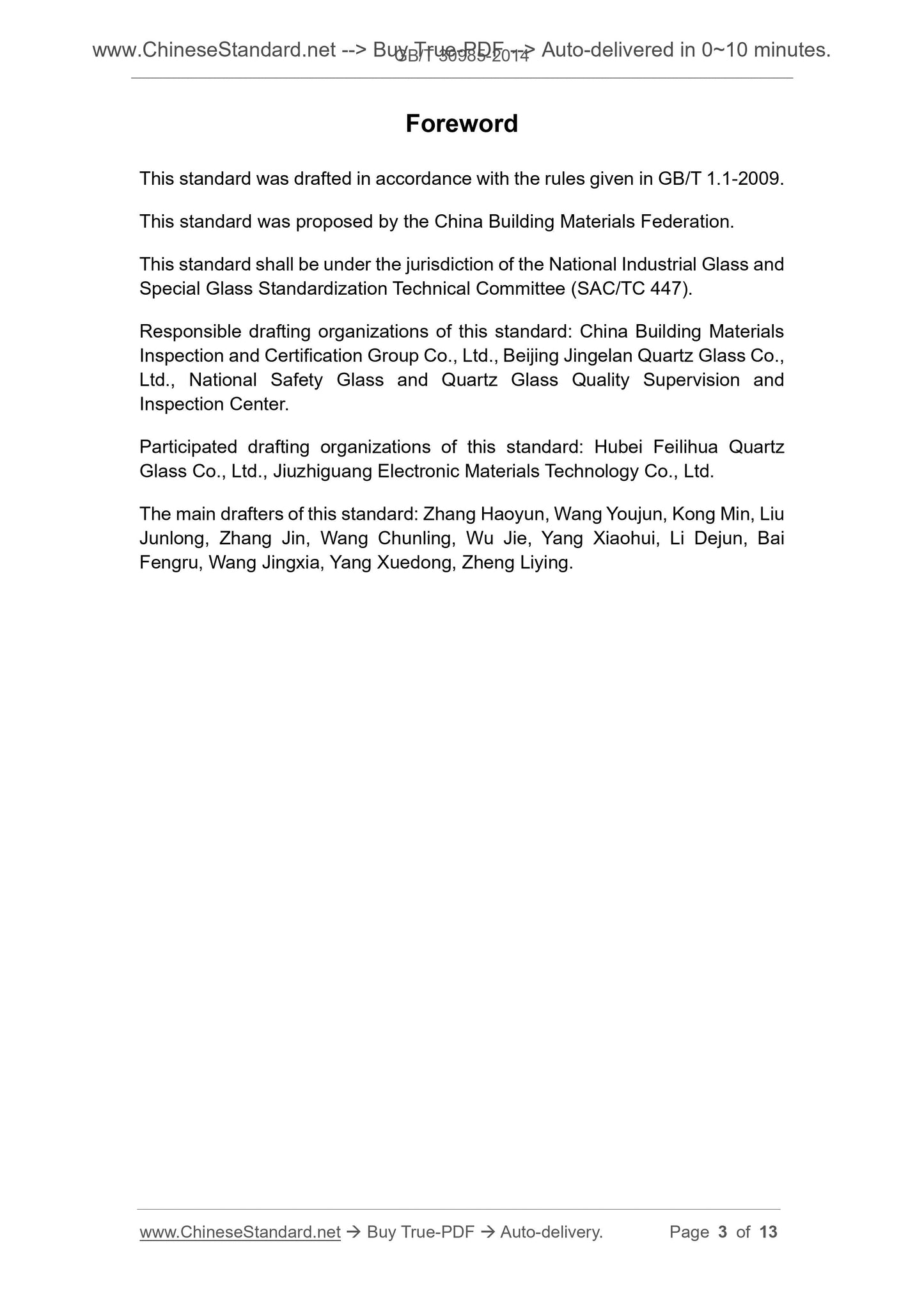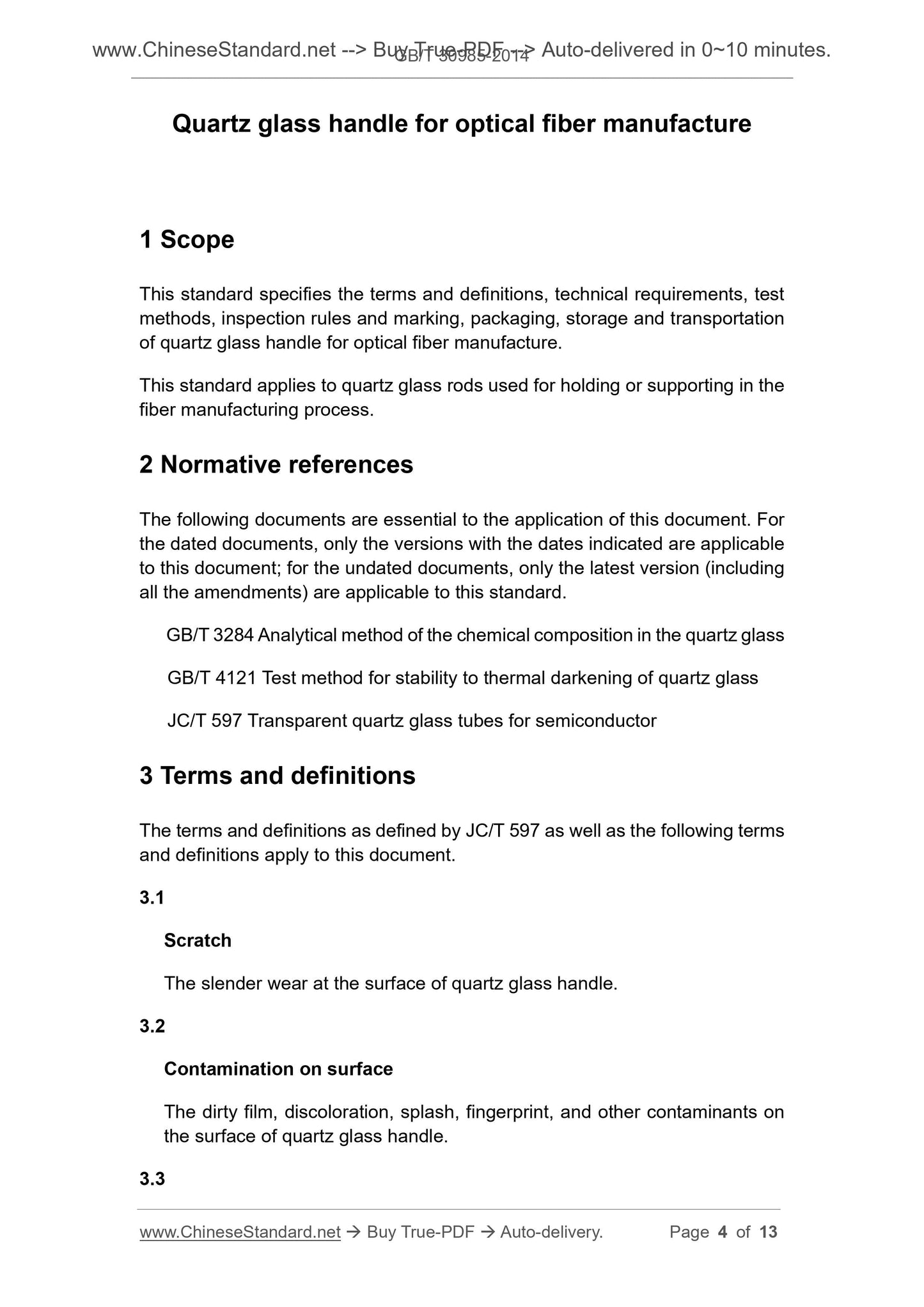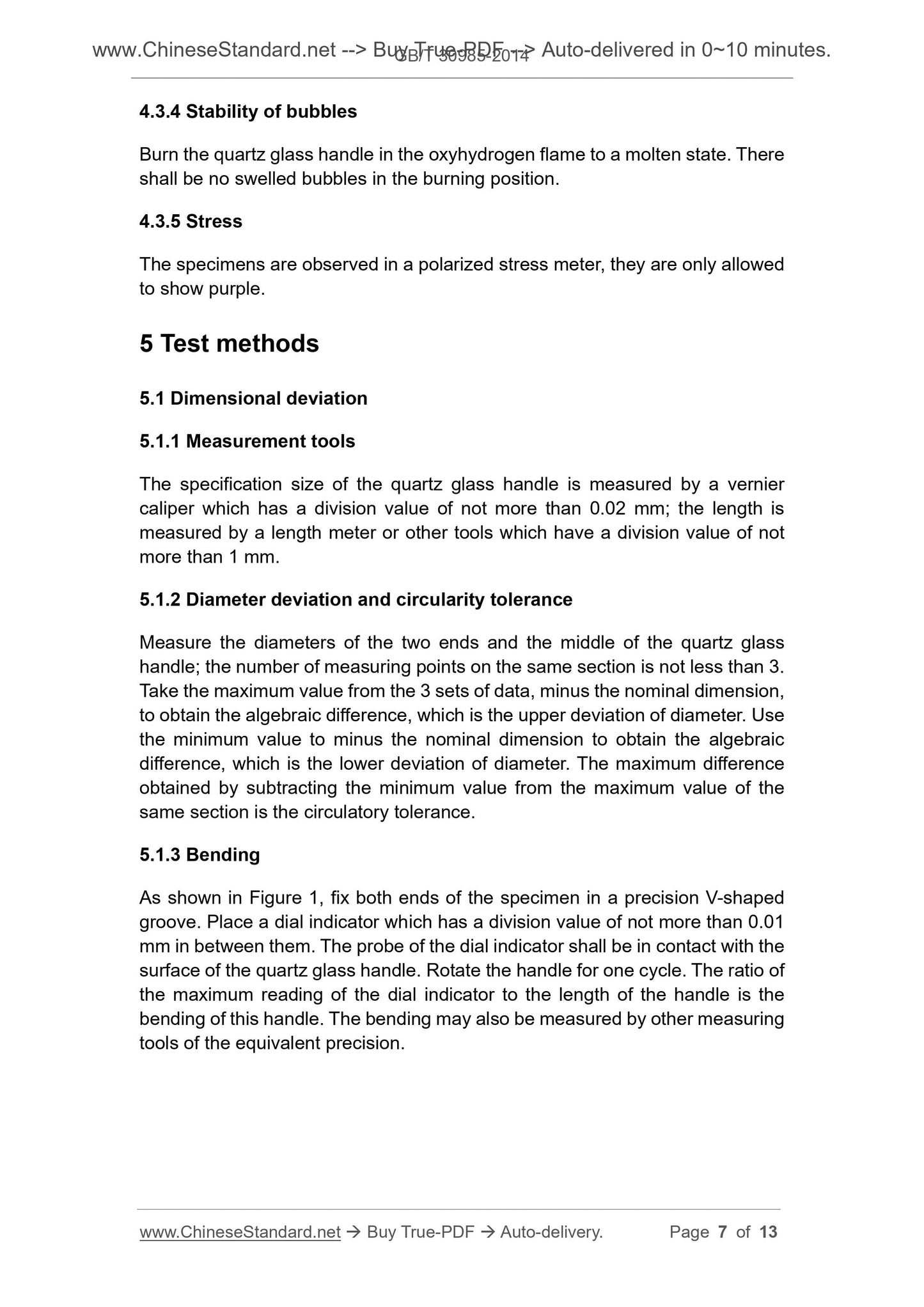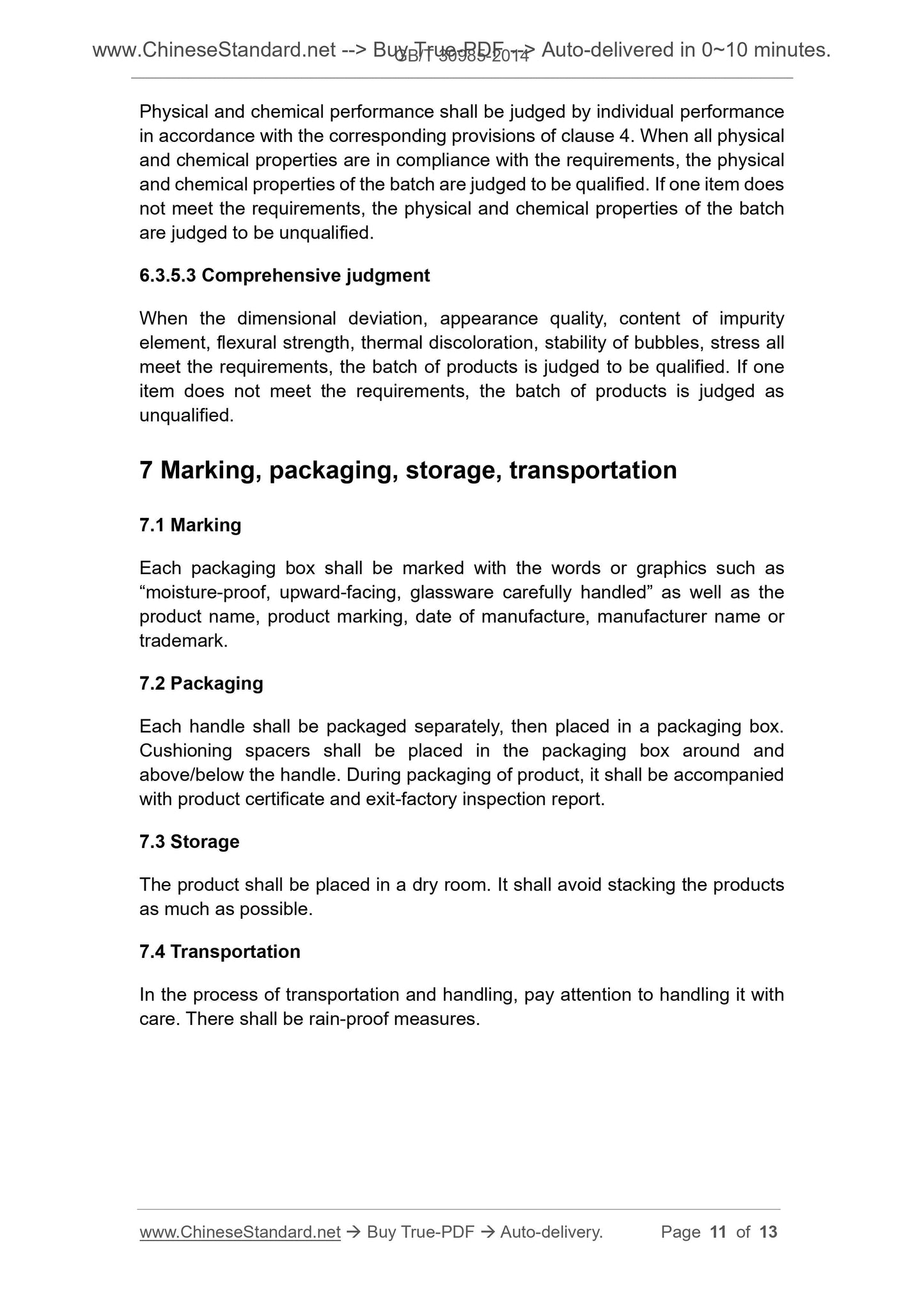1
/
de
6
PayPal, credit cards. Download editable-PDF & invoice In 1 second!
GB/T 30985-2014 English PDF (GBT30985-2014)
GB/T 30985-2014 English PDF (GBT30985-2014)
Prix habituel
$150.00 USD
Prix habituel
Prix promotionnel
$150.00 USD
Prix unitaire
/
par
Frais d'expédition calculés à l'étape de paiement.
Impossible de charger la disponibilité du service de retrait
Delivery: 3 seconds. Download true-PDF + Invoice.
Get QUOTATION in 1-minute: Click GB/T 30985-2014
Historical versions: GB/T 30985-2014
Preview True-PDF (Reload/Scroll if blank)
GB/T 30985-2014: Quartz glass handle for optical fiber manufacture
GB/T 30985-2014
GB
NATIONAL STANDARD OF THE
PEOPLE’S REPUBLIC OF CHINA
ICS 81.040.30
Q 35
Quartz glass handle for optical fiber manufacture
ISSUED ON. JULY 24, 2014
IMPLEMENTED ON. MARCH 01, 2015
Issued by. General Administration of Quality Supervision, Inspection and
Quarantine;
Standardization Administration of PRC.
Table of Contents
Foreword ... 3
1 Scope ... 4
2 Normative references ... 4
3 Terms and definitions ... 4
4 Technical requirements ... 5
5 Test methods ... 7
6 Inspection rules ... 9
7 Marking, packaging, storage, transportation ... 11
Appendix A (Normative) Test method of flexural strength of quartz glass handle
... 12
Foreword
This standard was drafted in accordance with the rules given in GB/T 1.1-2009.
This standard was proposed by the China Building Materials Federation.
This standard shall be under the jurisdiction of the National Industrial Glass and
Special Glass Standardization Technical Committee (SAC/TC 447).
Responsible drafting organizations of this standard. China Building Materials
Inspection and Certification Group Co., Ltd., Beijing Jingelan Quartz Glass Co.,
Ltd., National Safety Glass and Quartz Glass Quality Supervision and
Inspection Center.
Participated drafting organizations of this standard. Hubei Feilihua Quartz
Glass Co., Ltd., Jiuzhiguang Electronic Materials Technology Co., Ltd.
The main drafters of this standard. Zhang Haoyun, Wang Youjun, Kong Min, Liu
Junlong, Zhang Jin, Wang Chunling, Wu Jie, Yang Xiaohui, Li Dejun, Bai
Fengru, Wang Jingxia, Yang Xuedong, Zheng Liying.
Quartz glass handle for optical fiber manufacture
1 Scope
This standard specifies the terms and definitions, technical requirements, test
methods, inspection rules and marking, packaging, storage and transportation
of quartz glass handle for optical fiber manufacture.
This standard applies to quartz glass rods used for holding or supporting in the
fiber manufacturing process.
2 Normative references
The following documents are essential to the application of this document. For
the dated documents, only the versions with the dates indicated are applicable
to this document; for the undated documents, only the latest version (including
all the amendments) are applicable to this standard.
GB/T 3284 Analytical method of the chemical composition in the quartz glass
GB/T 4121 Test method for stability to thermal darkening of quartz glass
JC/T 597 Transparent quartz glass tubes for semiconductor
3 Terms and definitions
The terms and definitions as defined by JC/T 597 as well as the following terms
and definitions apply to this document.
3.1
Scratch
The slender wear at the surface of quartz glass handle.
3.2
Contamination on surface
The dirty film, discoloration, splash, fingerprint, and other contaminants on
the surface of quartz glass handle.
3.3
4.3.4 Stability of bubbles
Burn the quartz glass handle in the oxyhydrogen flame to a molten state. There
shall be no swelled bubbles in the burning position.
4.3.5 Stress
The specimens are observed in a polarized stress meter, they are only allowed
to show purple.
5 Test methods
5.1 Dimensional deviation
5.1.1 Measurement tools
The specification size of the quartz glass handle is measured by a vernier
caliper which has a division value of not more than 0.02 mm; the length is
measured by a length meter or other tools which have a division value of not
more than 1 mm.
5.1.2 Diameter deviation and circularity tolerance
Measure the diameters of the two ends and the middle of the quartz glass
handle; the number of measuring points on the same section is not less than 3.
Take the maximum value from the 3 sets of data, minus the nominal dimension,
to obtain the algebraic difference, which is the upper deviation of diameter. Use
the minimum value to minus the nominal dimension to obtain the algebraic
difference, which is the lower deviation of diameter. The maximum difference
obtained by subtracting the minimum value from the maximum value of the
same section is the circulatory tolerance.
5.1.3 Bending
As shown in Figure 1, fix both ends of the specimen in a precision V-shaped
groove. Place a dial indicator which has a division value of not more than 0.01
mm in between them. The probe of the dial indicator shall be in contact with the
surface of the quartz glass handle. Rotate the handle for one cycle. The ratio of
the maximum reading of the dial indicator to the length of the handle is the
bending of this handle. The bending may also be measured by other measuring
tools of the equivalent precision.
Physical and chemical performance shall be judged by individual performance
in accordance with the corresponding provisions of clause 4. When all physical
and chemical properties are in compliance with the requirements, the physical
and chemical properties of the batch are judged to be qualified. If one item does
not meet the requirements, the physical and chemical properties of the batch
are judged to be unqualified.
6.3.5.3 Comprehensive judgment
When the dimensional deviation, appearance quality, content of impurity
element, flexural strength, thermal discoloration, stability of bubbles, stress all
meet the requirements, the batch of products is judged to be qualified. If one
item does not meet the requirements, the batch of products is judged as
unqualified.
7 Marking, packaging, storage, transportation
7.1 Marking
Each packaging box shall be marked with the words or graphics such as
“moisture-proof, upward-facing, glassware carefully handled” as well as the
product name, product marking, date of manufacture, manufacturer name or
trademark.
7.2 Packaging
Each handle shall be packaged separately, then placed in a packaging box.
Cushioning spacers shall be placed in the packaging box around and
above/below the handle. During packaging of product, it shall be accompanied
with product certificate and exit-factory inspection report.
7.3 Storage
The product shall be placed in a dry room. It shall avoid stacking the products
as much as possible.
7.4 Transportation
In the process of transportation and handling, pay attention to handling it with
care. There shall be rain-proof measures.
Get QUOTATION in 1-minute: Click GB/T 30985-2014
Historical versions: GB/T 30985-2014
Preview True-PDF (Reload/Scroll if blank)
GB/T 30985-2014: Quartz glass handle for optical fiber manufacture
GB/T 30985-2014
GB
NATIONAL STANDARD OF THE
PEOPLE’S REPUBLIC OF CHINA
ICS 81.040.30
Q 35
Quartz glass handle for optical fiber manufacture
ISSUED ON. JULY 24, 2014
IMPLEMENTED ON. MARCH 01, 2015
Issued by. General Administration of Quality Supervision, Inspection and
Quarantine;
Standardization Administration of PRC.
Table of Contents
Foreword ... 3
1 Scope ... 4
2 Normative references ... 4
3 Terms and definitions ... 4
4 Technical requirements ... 5
5 Test methods ... 7
6 Inspection rules ... 9
7 Marking, packaging, storage, transportation ... 11
Appendix A (Normative) Test method of flexural strength of quartz glass handle
... 12
Foreword
This standard was drafted in accordance with the rules given in GB/T 1.1-2009.
This standard was proposed by the China Building Materials Federation.
This standard shall be under the jurisdiction of the National Industrial Glass and
Special Glass Standardization Technical Committee (SAC/TC 447).
Responsible drafting organizations of this standard. China Building Materials
Inspection and Certification Group Co., Ltd., Beijing Jingelan Quartz Glass Co.,
Ltd., National Safety Glass and Quartz Glass Quality Supervision and
Inspection Center.
Participated drafting organizations of this standard. Hubei Feilihua Quartz
Glass Co., Ltd., Jiuzhiguang Electronic Materials Technology Co., Ltd.
The main drafters of this standard. Zhang Haoyun, Wang Youjun, Kong Min, Liu
Junlong, Zhang Jin, Wang Chunling, Wu Jie, Yang Xiaohui, Li Dejun, Bai
Fengru, Wang Jingxia, Yang Xuedong, Zheng Liying.
Quartz glass handle for optical fiber manufacture
1 Scope
This standard specifies the terms and definitions, technical requirements, test
methods, inspection rules and marking, packaging, storage and transportation
of quartz glass handle for optical fiber manufacture.
This standard applies to quartz glass rods used for holding or supporting in the
fiber manufacturing process.
2 Normative references
The following documents are essential to the application of this document. For
the dated documents, only the versions with the dates indicated are applicable
to this document; for the undated documents, only the latest version (including
all the amendments) are applicable to this standard.
GB/T 3284 Analytical method of the chemical composition in the quartz glass
GB/T 4121 Test method for stability to thermal darkening of quartz glass
JC/T 597 Transparent quartz glass tubes for semiconductor
3 Terms and definitions
The terms and definitions as defined by JC/T 597 as well as the following terms
and definitions apply to this document.
3.1
Scratch
The slender wear at the surface of quartz glass handle.
3.2
Contamination on surface
The dirty film, discoloration, splash, fingerprint, and other contaminants on
the surface of quartz glass handle.
3.3
4.3.4 Stability of bubbles
Burn the quartz glass handle in the oxyhydrogen flame to a molten state. There
shall be no swelled bubbles in the burning position.
4.3.5 Stress
The specimens are observed in a polarized stress meter, they are only allowed
to show purple.
5 Test methods
5.1 Dimensional deviation
5.1.1 Measurement tools
The specification size of the quartz glass handle is measured by a vernier
caliper which has a division value of not more than 0.02 mm; the length is
measured by a length meter or other tools which have a division value of not
more than 1 mm.
5.1.2 Diameter deviation and circularity tolerance
Measure the diameters of the two ends and the middle of the quartz glass
handle; the number of measuring points on the same section is not less than 3.
Take the maximum value from the 3 sets of data, minus the nominal dimension,
to obtain the algebraic difference, which is the upper deviation of diameter. Use
the minimum value to minus the nominal dimension to obtain the algebraic
difference, which is the lower deviation of diameter. The maximum difference
obtained by subtracting the minimum value from the maximum value of the
same section is the circulatory tolerance.
5.1.3 Bending
As shown in Figure 1, fix both ends of the specimen in a precision V-shaped
groove. Place a dial indicator which has a division value of not more than 0.01
mm in between them. The probe of the dial indicator shall be in contact with the
surface of the quartz glass handle. Rotate the handle for one cycle. The ratio of
the maximum reading of the dial indicator to the length of the handle is the
bending of this handle. The bending may also be measured by other measuring
tools of the equivalent precision.
Physical and chemical performance shall be judged by individual performance
in accordance with the corresponding provisions of clause 4. When all physical
and chemical properties are in compliance with the requirements, the physical
and chemical properties of the batch are judged to be qualified. If one item does
not meet the requirements, the physical and chemical properties of the batch
are judged to be unqualified.
6.3.5.3 Comprehensive judgment
When the dimensional deviation, appearance quality, content of impurity
element, flexural strength, thermal discoloration, stability of bubbles, stress all
meet the requirements, the batch of products is judged to be qualified. If one
item does not meet the requirements, the batch of products is judged as
unqualified.
7 Marking, packaging, storage, transportation
7.1 Marking
Each packaging box shall be marked with the words or graphics such as
“moisture-proof, upward-facing, glassware carefully handled” as well as the
product name, product marking, date of manufacture, manufacturer name or
trademark.
7.2 Packaging
Each handle shall be packaged separately, then placed in a packaging box.
Cushioning spacers shall be placed in the packaging box around and
above/below the handle. During packaging of product, it shall be accompanied
with product certificate and exit-factory inspection report.
7.3 Storage
The product shall be placed in a dry room. It shall avoid stacking the products
as much as possible.
7.4 Transportation
In the process of transportation and handling, pay attention to handling it with
care. There shall be rain-proof measures.
Share
